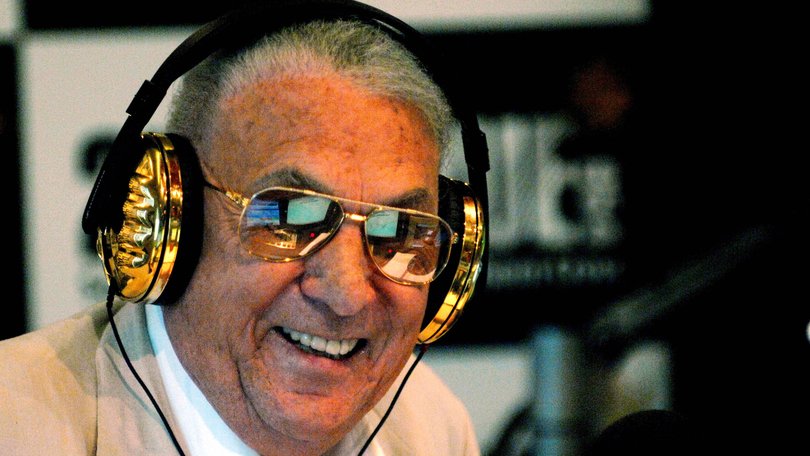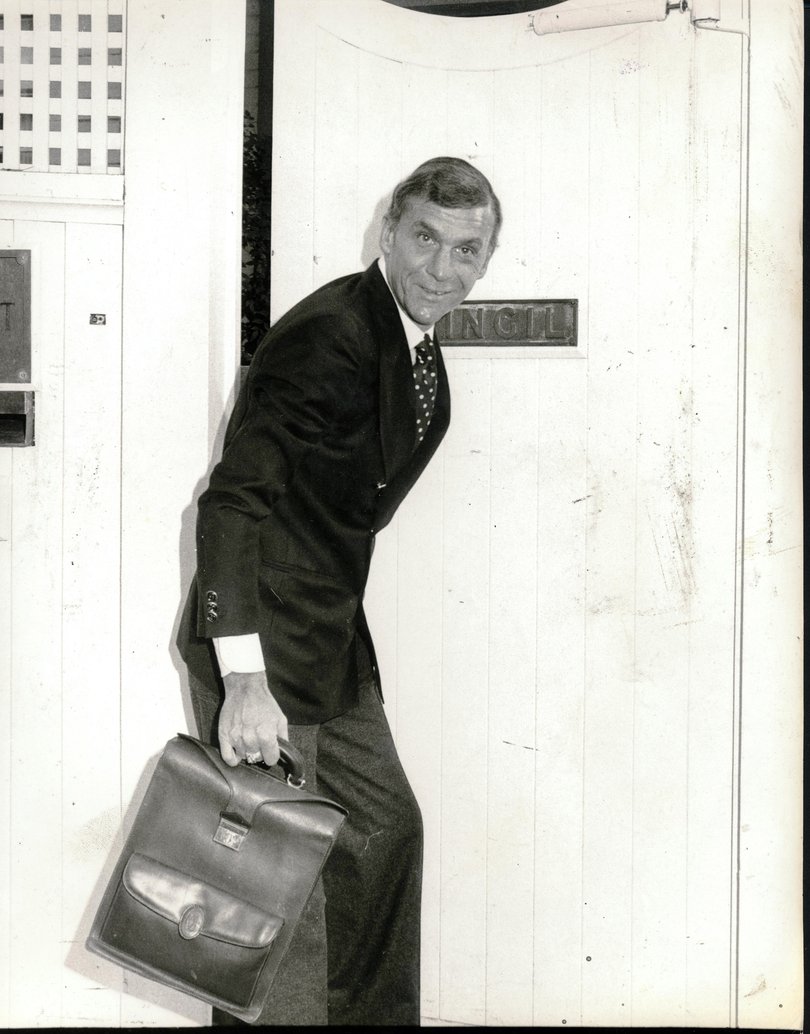AARON PATRICK: Before Facebook or Twitter, John Laws was the voice of Australians

John Laws, who died on Sunday aged 90, helped make talk-back radio the most powerful medium, establishing a dominance that was unmatched modern Australia.
Laws was so popular on AM radio in the 1980s and 1990s that prime ministers, premiers and treasurers dared not defy a broadcaster who seemed to epitomise Australia itself. He backed regular people over big business and large government, celebrating Australian values and culture with a larrikinism and occasionally ribald humour that appalled the intelligentsia.
“I let the listeners tell me,” Laws said in his last broadcast interview, to 2GB broadcaster Ben Fordham. “It was their program. I’ld say: ‘Tell me what’s on your mind Australia.’”
Sign up to The Nightly's newsletters.
Get the first look at the digital newspaper, curated daily stories and breaking headlines delivered to your inbox.
By continuing you agree to our Terms and Privacy Policy.Starting as a DJ for Bendigo radio station in 1953, Laws seized upon a 1967 legal change allowing telephone conversations to broadcast on air. The era of talk back had begun. Laws’ deep, mellifluous voice dubbed the “golden tonsils” and willingness to argue with callers who did not share his opinions made AM talkback the Facebook or Twitter of its day in the pre-internet era.

Political power
Mostly from working-class backgrounds themselves, the NSW Labor Party leadership chose Laws as their broadcaster of choice because of his ability to reach voters in marginal seats across Western Sydney.
“Forget the press gallery,” Paul Keating said. “Educate John Laws and you educate Australia.”
The 1983 election, which returned Labor to power, was dubbed the “John Laws election” for the number of major campaign announcements politicians made on his show.
The peak of Laws’ influence may have come three years later, on May 14, when Mr Keating called into his show from a restaurant kitchen. The then treasurer warned Australia’s imbalance between exports and imports posed a serious, long-term threat. “We will end up being a third-rate economy ... a banana republic,” he said.
The possibility of Australia becoming a South Pacific version of Honduras or Costa Rica was so shocking that it created a sense of crisis that allowed Mr Keating and Prime Minister Bob Hawke to introduce free-market policies that were the foundation of their government.
Mr Keating on Monday hailed Laws for “educating a big and substantial chunk of the middle ground constituency.”
“As it turned out, a large measure of the country’s economic literacy was to emerge from John’s program,” Mr Keating said in a statement.
Among the beneficiaries of the more prosperous Australia was Laws. Widely believed to be the best-paid broadcaster in radio, he liked to show off his collection of expensive cars and engage in long, drunken lunches at Otto Ristorante on Finger Wharf in the inner-city suburb of Woolloomooloo where he lived with his third wife, Caroline.
Ethics?
Despite his closeness to politicians — he once spent new year’s eve at former prime minster Gough and Margaret Whitlam’s apartment in Paris — Laws did not regard himself as a journalist, a distinction that would lead to his greatest scandal.
In 1999 the ABC revealed Laws and fellow 2UE host Alan Jones were paid to make positive comments about the major banks and other big companies, including Qantas, Optus and Foxtel.
In return for food, drinks and other perks at Sydney’s Star City, Laws agreed not to disparage gambling. He cut off callers who wanted to talk about the death of a casino patron after a brawl with security men, according to reports at the time.
What become known as the “cash for comment” affair badly undermined the reputation of AM talkback radio. Laws did not help the industry’s credibility when, asked by a journalist if he actions were ethical, he said: “I’m an entertainer, there isn’t a hook for ethics.”
An official investigation found he accepted $500,000 from the banks’ lobby group to end his vehement criticisms of them, and read scripts that listeners were not told were ads. The banks’ association said it was up to the radio station to disclose the arrangement, as though the commentary was the same as Laws’ ads for Valvoline car oil, which became so famous .
Laws continued to present his morning 2UE show, but his older audience was dying. By the time he left mainstream radio in 2007, AM talkback radio was no longer the powerful political force it had been.
Younger listeners preferred the clearer sound of FM stations and were more interested in entertainment and popular culture than politics and current affairs. The World Wide Web provided a new way for entertainers to reach audiences.
Tributes
Laws had no desire to retire. In 2011 he joined 2SM, the Sydney outlet of a network of mostly country radio stations owned by the reclusive Caralis family, a Greek family who started their careers selling fruit and vegetables.
Driving a Rolls Royce to work each day, Laws would arrive 15 minutes before his show began at 9am, relying on his decades of radio experience to get through each show rather than detailed preparation. To fill the hours, guests were allowed to talk at length.
The size of Laws’ 2SM audiences was unclear. Owners Super Radio Network chose not to participate in industry surveys covering Sydney, presumably to save money. He retired a year ago, and went holidaying in Europe.
No one at the company responded to requests for comment on Monday, although 2SM held a two-hour tribute to Laws and Labor politician Graham Richardson, who died on Saturday aged 76.
Anthony Albanese was the first person on the show, demonstrating that Laws’ political power lasts beyond his death.
He said Laws sometimes kept him on air for half0an-hour after being offered 10 minutes of primemi nisterial time.
“We won’t see any better in our lifetime,” Mr Albanese said.
Others who offered praise included NSW Premier Chris Minns, actor Russell Crowe, a Finger Wharf neighbour, and Kyle Sandilands, who may have inherited Laws’ title as the best-paid man on radio.
“John Laws was one of the true originals,” Sandilands posted on X. “He said what he thought, didn’t care who he offended, but could also show deep compassion when required.”
Sandilands’ rise shows how much radio has changed. Laws challenged politicians over policy.
On Monday, Sandilands had the prime minister on what the broadcaster calls “Australia’s biggest radio show”. After listing Mr Albanese’s recent overseas trips and diplomatic initiatives, Sandilands said: ”Successful on every aspect, correct?”
Laws might have choked on those gold tonsils.

